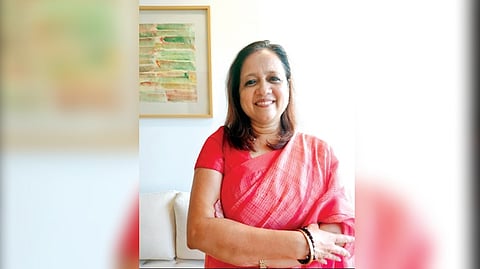

CHENNAI: Even as the roll out of ‘Jan Dhan’ initiative in 2014 has enabled India to establish a record with the country reporting one of the “highest growth” when it comes to access, there are several concerns. At 77.5 per cent, the access, as per the global Findex report is excellent, but the number of inactive accounts are too significant to brush it under the carpet.
Kalpana Ajayan, regional head, South Asia, Women’s World Banking (WWB), an international non-profit enterprise, tells us that "as far as enrolling women from the economically constrained strata of society into the formal banking system is concerned, banks should focus on increasing engagement of Indians, who now have access to PMJDY accounts, especially women. And that's not all, when women are true beneficiaries of financial services, the outcomes can be enjoyed not only by her but by their families, their community and the larger economy."
She points out that except for direct benefit transfers (DBT) that happen out of such savings account, they do not avail the overdraft or other facilities available through a banking system. As there is no credit history available and in the absence of a formal saving habit, they tend to lose out all the benefits. Thus, the natural saving habit has not been used properly. Women customers feel intimidated as their perception is banks are only for the rich people, she says, citing the findings of a survey. “They don’t feel welcome enough,” Kalpana says but the good thing is the investment in the banking correspondent (BC) channel has been yielding good results.
In fact, unlike other parts of the country where the ‘chaapa’ (thumb impression) is what gets the beneficiary through the KYC (know your customer) formalities, the state of Tamil Nadu has been seeing traction with the adoption of the mobile model. “In this case, the mobile agents come home,” she says, adding that TN is far up the curve. One of the banks with which WWB works has 50-55 women BCs.
WWB entered TN about four months ago and is still in a data collation state. However, the research reports are indicative of the potential in the southern state as the not-for-profit bank thriving on gender intentionality aims to take India past the 25 million mark by 2027 (currently at six million) out of its global target of 1 billion.
Even as it strives to play the advisory and advocacy role effectively, Kalpana also takes us through the innovative efforts of WWB. For instance, apart from camps at ground, the training session uses the easy and popular ‘snakes and ladders’ game to spread awareness about the length and breadth of services that women customers can avail. “We tell them that the ups and downs in life be it flood, drought or COVID-19 are like the game’s snakes and ladders,” she says, making a case that investing in women does make business sense.
Considering India's agrarian DNA, the women's contributions in the field are totally side-stepped as she cannot articulate her earnings despite her labour involvement. “Though they take loans to seed a business, when it comes to growth by expanding the business, women need to have access to banking that allows them to control financial resources and have a say in making strategic choices/ decisions in their lives," rues Kalpana, who points out that 85 per cent of the ‘Sishu’ loans in the Rs 50,000 range are availed by the fairer sex.
Visit news.dtnext.in to explore our interactive epaper!
Download the DT Next app for more exciting features!
Click here for iOS
Click here for Android